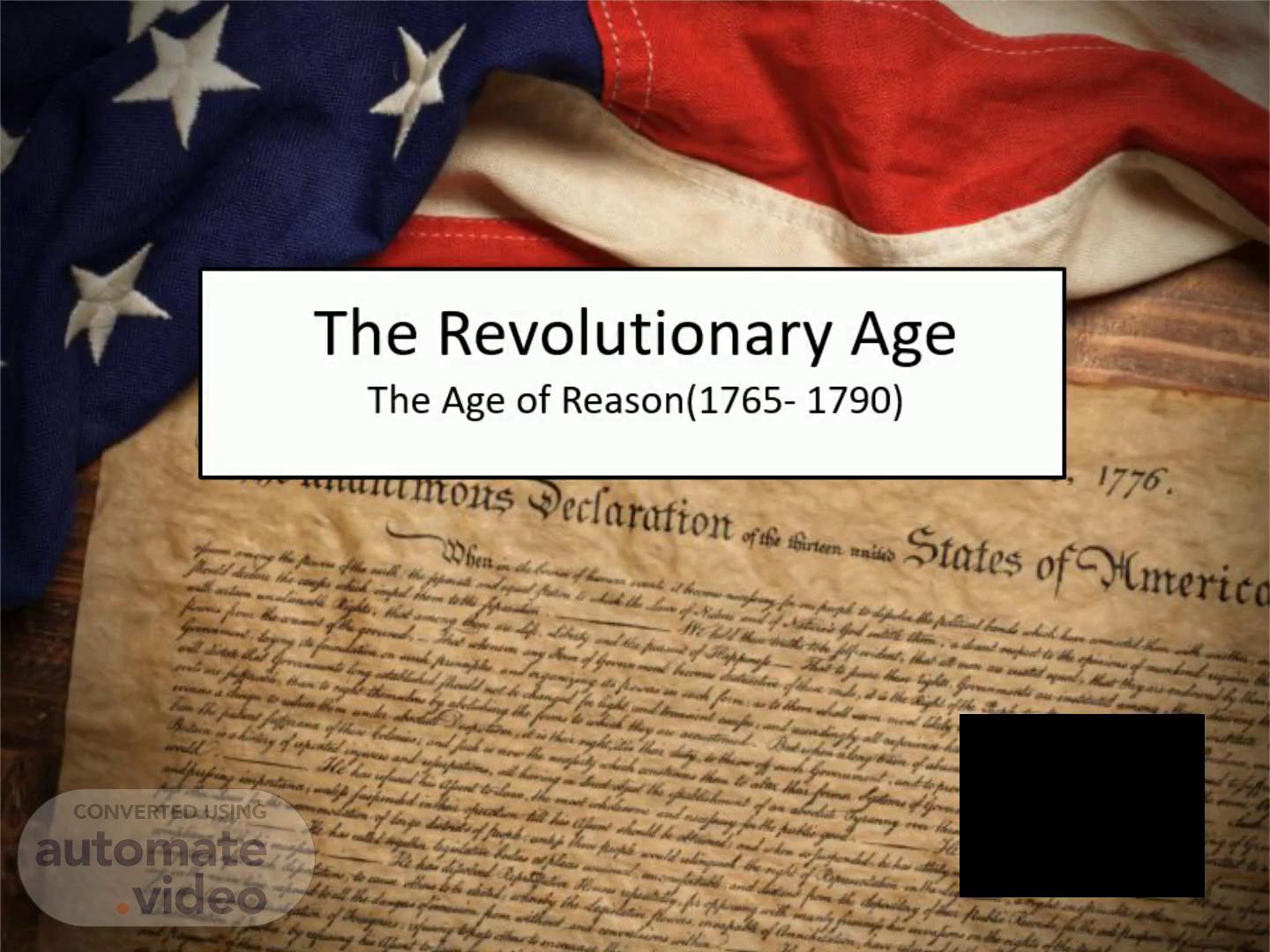
The Revolutionary Age The Age of Reason(1765- 1790)
Scene 1 (0s)
The Revolutionary Age The Age of Reason(1765- 1790).
Scene 2 (9s)
Background : The Age of Reason. By the mid to late 1700s, the Puritan influence began to fade. Time of American enlightenment. The focus was on logic and reason. People started to question. Cultural and scientific advance. Desire to improve life for everyone. The writers and thinkers valued reason over faith. Emphasis on rationality rather than tradition, scientific enquiry rather than unquestioning religious belief, representative government instead of monarchy..
Scene 3 (31s)
The Beginning of Revolutionary Age. A movement in Europe that spread to America that advocated the use of reason and individualism instead of tradition. Reaction against excesses and extremes of people of faith such as Puritans. People arrived at truth by using reason rather than by relying on the authority of the past or religion. Revolutionary war: People had to write texts to communicate and educate colonists and Britain about war. Establishment of American printing press..
Scene 4 (53s)
American Revolution. 1765 – The Stamp Act ignited the first serious opposition to English rule in American colonies. There were thirteen states on the East Coast of America in the second half of the 18th century. These states were known in Britain as The Colonies. Ancestors of people who had emigrated from Britain. They were part of the British Empire and were ruled by King George III..
Scene 5 (1m 13s)
Literary Features. Most important pieces of Literature were political documents, speeches, and pamphlets. Themes of independence, freedom, and discontent towards Britain. Political in nature, came in the form of political pamphlets. Writers ventured beyond the Puritan literary style and its religious themes – developed the styles of writings that grew from distinctly American experiences. Writers no longer copied the formal style of British writers..
Scene 6 (1m 34s)
Literary Features. Most important pieces of Literature were political documents, speeches, and pamphlets. Themes of independence, freedom, and discontent towards Britain. Political in nature, came in the form of political pamphlets. Writers ventured beyond the Puritan literary style and its religious themes – developed the styles of writings that grew from distinctly American experiences. Writers no longer copied the formal style of British writers..
Scene 7 (1m 40s)
Notable writings of the Era. The power of sympathy – William Hill Brown – a tragic love story between siblings who fell in love without knowing they were related. The revolutionary period is notable for the political writings of Benjamin Franklin, Thomas Paine, Thomas Jefferson, and Alexander Hamilton. Thomas Paine authored “Common Sense” Thomas Jefferson wrote “The Declaration of Independence”, also wrote may other politically based writings such as Notes on the State of Virginia..
Scene 8 (2m 2s)
Literary Works. Benjamin Franklin – The Autobiography of B.F. and Poor Richard’s Almanac. Patrick Henry – Speech of the Second Virginia Convention. Thomas Jefferson – The Declaration of Independence. Thomas Paine – The Crisis, Common Sense. The Power of Sympathy – William Hill Brown – First American Novel (1789).
Scene 9 (2m 18s)
Literary Works. Benjamin Franklin – The Autobiography of B.F. and Poor Richard’s Almanac. Patrick Henry – Speech of the Second Virginia Convention. Thomas Jefferson – The Declaration of Independence. Thomas Paine – The Crisis, Common Sense. The Power of Sympathy – William Hill Brown – First American Novel (1789).
Scene 10 (2m 24s)
Challenges. America’s literary Independence was slowed because – There was a lingering identification with England – they associated to British customs. There was a lack of an audience. Absence of adequate copyright laws. Piracy, which was allowed in the copyright law of 1790, reached its highest point in 1815, corresponding with the lowest point of American writing. Difficult economic and political conditions hampered publishing: until 1825, most American authors paid printers to publish their work..
Scene 11 (2m 46s)
End of the Age of Revolution. In September 1783 the united states government and the B ritish parliament officially agreed to the Treaty of Paris, which ended the American Revolution. American writers were firmly established as important contributors to a uniquely American national identity by the end of the world. 1790, implementation of the United States constitution..
Scene 12 (3m 4s)
Thank You!.